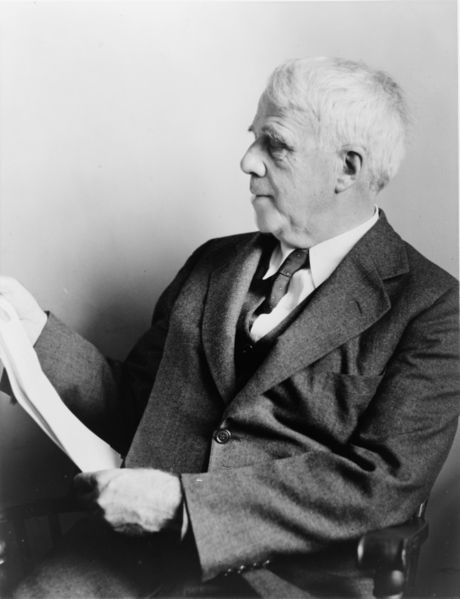A Poet’s Poet: Robert Frost
This fifth post, from a series of eight, draws from an archive of recently discovered audio recordings of America's most important modern poets, taken during Pearl London's renowned poetry seminars at the New School. The most compelling moments of these conversations were transcribed and published in Poetry in Person: Twenty-five Years of Conversation with America's Poets (Knopf), named by CSM "One of the ten best (nonfiction) books of 2010." The clips used below are all taken from the audiobook companion to Poetry in Person, offering extended, thirty to sixty minute cuts of eight of the best conversations.
 One thing I was surprised to find, as I started listening through the tapes of Pearl London’s classes, was how often the name Robert Frost came up in her conversations with poets. Frost has fallen out of favor with the academy in the decades since his death, relegated to Hallmark cards and middle school pick-your-favorite poem assignments. Here, however, he seems to have become a poet’s poet, celebrated for verse, prose and a very modern mood of darkness.
One thing I was surprised to find, as I started listening through the tapes of Pearl London’s classes, was how often the name Robert Frost came up in her conversations with poets. Frost has fallen out of favor with the academy in the decades since his death, relegated to Hallmark cards and middle school pick-your-favorite poem assignments. Here, however, he seems to have become a poet’s poet, celebrated for verse, prose and a very modern mood of darkness.
Paul Muldoon, for instance, is not only an admirer of Frost, but also, quite literally, an inhabiter of the same space; he has spent thirteen summers, so far, at Frost’s old cabin. He and London discuss several observations of Frost’s: that poetry is a “feat of associations,” and that a poem be a "momentary stay against confusion."
[audio:https://alexanderneubauer.com/wp-content/uploads/2011/04/muldoon_frost.mp3|titles=muldoon_frost]Comparing Frost to Auden, William Matthews said he was drawn as a high school student to the modesty and distinctly American quality of Frost’s poetic voice. Like Muldoon, Matthews spent a summer at the Frost estate, and he remarks to London that the place felt very isolated, deliberately so. Finding the corollary in his poetry, London notes the “Hopper-like quality of insularity” in Frost—calling up another artist that was mentioned frequently by the poets in London’s class.
[audio:https://alexanderneubauer.com/wp-content/uploads/2011/04/williams.frost_.mp3|titles=williams.frost]London again brings up the darker side of Frost in her discussion with Edward Hirsch, mentioning the large number of empty barns and wintry landscapes in Frost's work. Hirsch points to Frost’s haunting “Desert Places” when trying to describe his conception of the absolute—an “absolute erasure,” a “terrifying invisibility”—and recites the last stanza of this poem for London:
[audio:https://alexanderneubauer.com/wp-content/uploads/2011/04/hirsch_frost.dark_.mp3|titles=hirsch_frost.dark]They cannot scare me with their empty spaces
Between stars—on stars where no human race is.
I have it in me so much nearer home
To scare myself with my own desert places.
They also discuss the popular misconception of Frost as a pastoral poet—“our Frost,” Hirsch says, referring to the modern poet’s Frost rather than the layman’s Frost, “is the darker Frost, and that Frost is unblinking…remorseless in his willingness to look at the darkness.”










